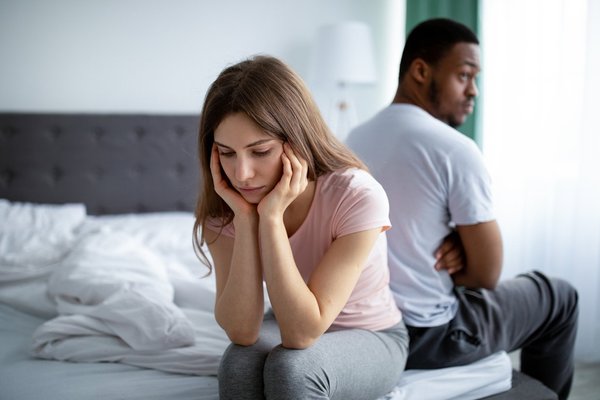

Learn about our editorial policies
Medically Reviewed
By Leslie Vandever
The human libido, or sex drive, tends to wax and wane, ebb and flow. And while the instinctual desire to reproduce is one reason it rises and even surges at times, it’s far from the only one.
Physical things, like our health, our age, the temperature, our surroundings, what we see and smell and feel, and a myriad of distractions (or lack of them) are all part of a healthy libido.
Our minds are also deeply involved in all thing libidinous. Emotions like love, happiness, joy, exuberance, and excitement, along with feelings like titillation and pleasure combine with each other—and everything else—to put us neatly “in the mood.”
Or out of it. It comes down to this: the same factors, both physical and mental, apply to a low sex drive just as much as a normal or overcharged one. Let’s take a closer look.
Check Your Health
When you feel well, your body’s fit, and your general health is good, you’ll probably feel like being intimate when the opportunity presents itself. But if your health is suffering, your libido may be, as well. Along with the usual, temporary suspects—colds, flu, fatigue, transitory stress, aches, and pains—there are a number of conditions that can affect your sex drive. They include:
- arthritis
- heart disease
- liver or kidney disease
- anemia
- cancer
- some neurological conditions and diseases
- conditions that affect hormone levels
Mental health problems can also cause your sex drive to wilt. These include:
- depression
- anxiety
- emotional/psychological stress in your relationship
- career or financial stress
- a history of sexual abuse
- Any of these issues, physical, mental, or both, can have a profound effect on your sex drive: loss of desire, inability to orgasm, uncomfortable or painful intercourse, etc.
Some medications, such as those prescribed for high blood pressure or depression, can affect your libido, as well.
Age Makes a Difference
Our bodies change dramatically in the course of a lifetime. As children, our sex drive is necessarily minimal. But when we grow into puberty, the hormones that influence our libidos become active, causing our bodies to mature sexually. As we get older, our libidos grow to match our bodies and minds—occasionally even outrunning them. As young adults, and during our prime reproductive years, unless illness or other dampening factors interfere, our bodies and minds are completely “turned on,” as they should be.
As we age, reproduction becomes more difficult. Our sex drive naturally starts to wane. In women, menopause can cause a precipitous drop in libido. And while older men don’t experience menopause, their sex drive often quiets down, as well.
It’s all perfectly normal. So is the fact that the mind still plays a large part in our sex drive, often keeping it going strong even though we’ve passed our reproductive years.
What To Do
A low sex drive isn’t necessarily dysfunctional. If it worries you, or you feel like something’s not right, talk to your health care provider. Whether the problem is physical or emotional—or both—your doctor can help you get to the bottom of it or refer you to skilled specialists who can.
And talk to your partner. Communication can soothe or even resolve problems before they become more complicated and ingrained. Honesty and openness in intimacy can also bring the two of you closer, improving not only your shared sexual experiences, but your relationship, as well.
A low libido doesn’t have to mean the end of a vital, pleasurable sex life.
Leslie Vandever is a professional journalist and freelance writer with more than 25 years of experience. She lives in the foothills of Northern California where she writes for Healthline.
You might be interested in





